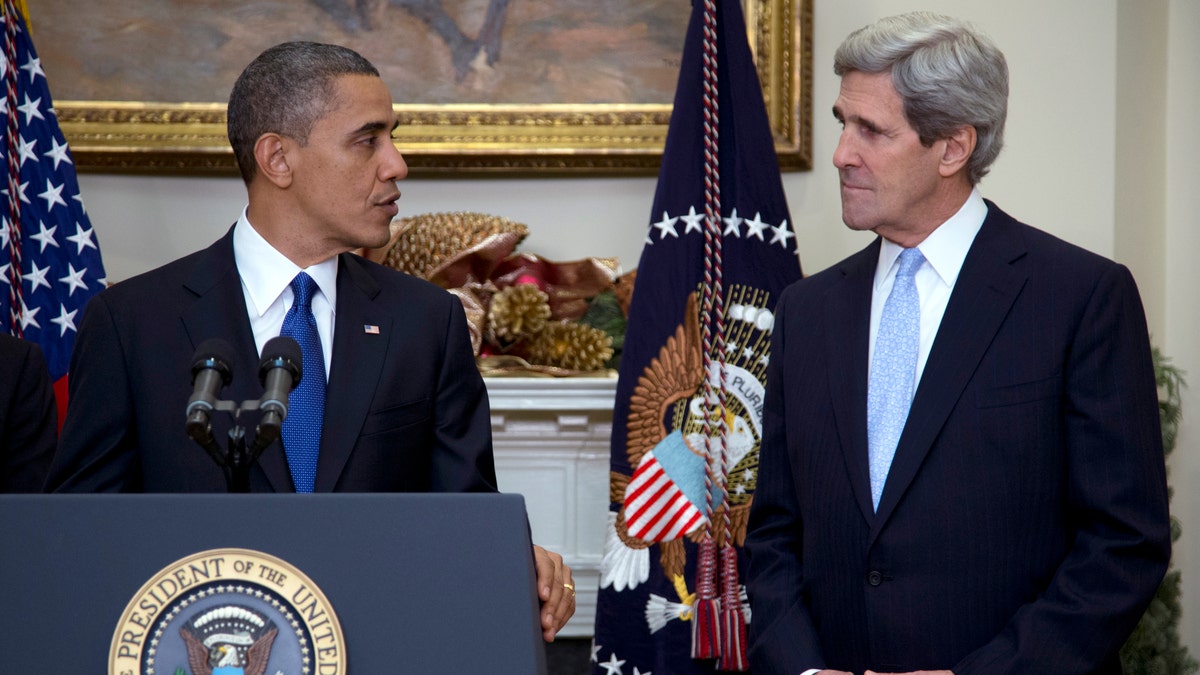
FILE: Dec. 21, 2012: President Obama announces his nomination of Sen. John Kerry, D-Mass., as next secretary of state, at the White House, in Washington. Summary
We may never really know if 2004 Democratic presidential nominee and Senator John Kerry was President Obama’s original choice to be Secretary of State or if he settled on Kerry after his first pick, Susan Rice, was forced out by her troublesome career and misleading statements on the Benghazi terrorist attack.
Ironically, Hillary Clinton’s appointment in 2008 as Secretary of State was forced on Obama by her presidential campaign supporters who insisted she play a major role in the then new Democratic administration after a bruising primary fight.
Secretary of State was a consolation prize for Clinton who had hoped to be president or at least Vice President. Bypassing Hillary for V.P., Obama set off a firestorm of liberal rage. But Democratic activists ultimately forced the newly elected president to give Clinton the job of America’s top diplomat amidst a flurry of press speculation that the rivalry would never heal.
We may also never know for sure if Hillary was Obama’s true preference or if he felt politically compelled to pick her in order to calm the Democratic activists who were threatening to abandon that early, fragile coalition.
Regardless of whom Obama wanted first as Hillary’s successor, Massachusetts Senator Kerry will undoubtedly sail through Senate confirmation hearings and easily be confirmed as American’s top diplomat. For Kerry, the job seems to be a crowning moment of achievement for a man who struggled in his youth to reconcile his service to his country with his hostility toward America’s foreign policies.
[pullquote]
President Obama’s appointment of John Kerry is also the first time a white male has held the job since Warren Christopher was appointed 20 years ago.
Before Hillary Clinton, President Bush had appointed Condoleezza Rice and Colin Powell to the post while President Bill Clinton appointed Madeleine Albright and Warren Christopher in 1993.
Both of President Obama’s appointments to the State Department have been former Democratic presidential contenders and partisan politicians -- making his choices the most political in almost 25 years.
Kerry will enter Foggy Bottom just a few months after his 2012 Democratic Convention speech in Charlotte, N.C. where he led party activists in a blistering and partisan critique of Republican presidential nominee Mitt Romney.
Kerry knew his convention performance was his audition for Secretary of State and he didn’t disappoint the Democratic faithful.
Kerry’s decidedly personal attacks on Romney stood in stark contrast to former Secretary of State Condi Rice’s critique of President Obama’s policies at the Republican Convention in Tampa, Florida.
Nevertheless, Republicans are hoping that Kerry will set aside partisan politics and work with both Republicans and Democrats to confront some the world’s most pressing issues.
Secretary of State Clinton has left Kerry a global mess with most every U.S. foreign policy unresolved. She failed to launch any serious effort on the long-running Israeli-Palestinian issue, delivered just one UN resolution on Iran’s illegal nuclear weapons pursuit, was out-maneuvered and humiliated by North Korea’s broken promises to abandon their nuclear pursuits and stood by and watched the Arab Spring be manipulated into the Islamic Awakening.
On Syria, Clinton has failed and Kerry will surely be looking for Republican cover since he has been humbled by his original insistence that Syria’s President Bashar al-Assad was “a reformer.”
Clinton has spent the last four years traveling a lot. Her successes are limited but include launching initiatives to empower women in the political process and de-listing the largest Iranian opposition group as a sponsor of terrorism.
Kerry will need to travel less and accomplish more.
His immediate attention is needed on Egypt and Iran. Egyptian President Morsi needs to be convinced to cut ties with Islamist extremists and the Iranian presidential elections are scheduled for June where students and activists are ready to rise up against their government.
Kerry will be under pressure from his Republican Senate colleagues to support the protesters who take to the streets in Iran despite the fact that Obama and Clinton failed to support the previous Green Revolution uprising.
In addition, the Iranian nuclear negotiations are rudder-less with the Europeans in charge while the Iranians continue their enrichment capabilities. Kerry will also have to deal with a non-existent U.S. policy on Mexico and a failing policy on Russia and China.
Then there’s the opportunity that looks to be developing in Venezuela with Hugo Chavez ailing and a possible quick special election should he die in office.
Kerry’s decades of experience on the Senate Foreign Relations Committee gives him a vast array of knowledge and experience to build from. But he will also have to manage his former colleague: Vice President Joe Biden. Biden considers himself a foreign policy expert and will surely be pressing Kerry on policy positions and staff appointments. One Massachusetts Democrat told me former Kerry presidential campaign donors are already lining up for ambassadorships.
For conservatives, the good news is that Senators John Kerry and John McCain (R-Ariz.) like each other and have worked closely for years. McCain has signaled that Kerry will be more bipartisan than people expect and will have broad support in the Senate.
Capitol Hill staffers point out that female Democratic Senators didn’t speak up to support Susan Rice during her troubles because they wanted John Kerry to be appointed Secretary of State.
Which makes you wonder; maybe Obama wanted Kerry all along.
